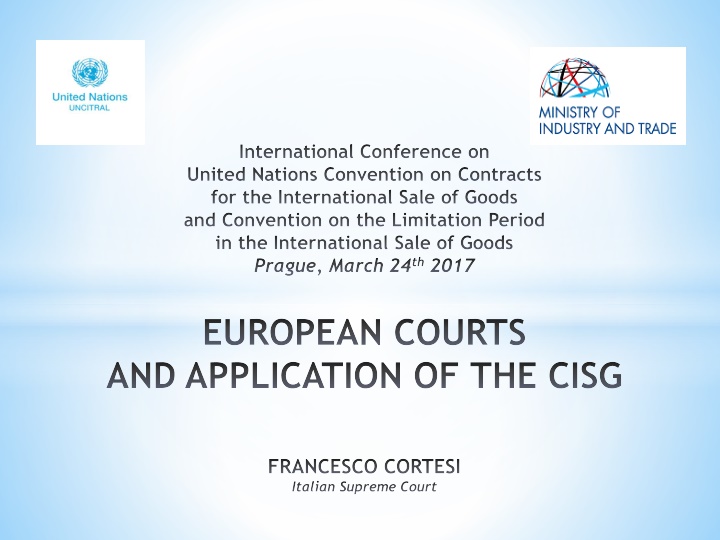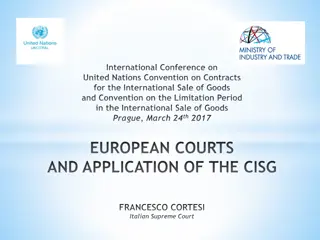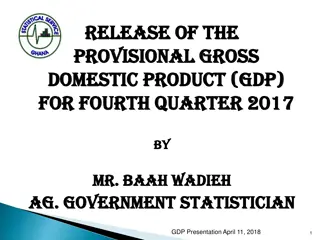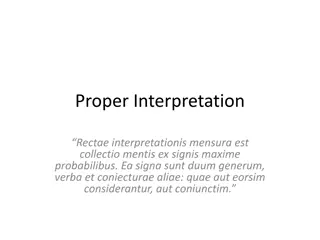International Conference on United Nations Convention on Contracts for the International Sale of Goods and Convention on the Limitation Period in the International Sale of Goods
Explore the applicability of the CISG and PIL rules in international contracts, focusing on the European Court's approach, challenges in transnational litigation, and the interpretation of CISG Article 7 for uniformity and good faith in international trade.
Download Presentation

Please find below an Image/Link to download the presentation.
The content on the website is provided AS IS for your information and personal use only. It may not be sold, licensed, or shared on other websites without obtaining consent from the author.If you encounter any issues during the download, it is possible that the publisher has removed the file from their server.
You are allowed to download the files provided on this website for personal or commercial use, subject to the condition that they are used lawfully. All files are the property of their respective owners.
The content on the website is provided AS IS for your information and personal use only. It may not be sold, licensed, or shared on other websites without obtaining consent from the author.
E N D
Presentation Transcript
International Conference on United Nations Convention on Contracts for the International Sale of Goods and Convention on the Limitation Period in the International Sale of Goods Prague, March 24th2017 EUROPEAN COURTS AND APPLICATION OF THE CISG FRANCESCO CORTESI Italian Supreme Court
WHAT IS THE APPLICABLE LAW TO INTERNATIONAL CONTRACTS ? GIULIANO VASSALLI (1915-2009) World War II has prepared the overcoming of state sovereignty, for which, according to many people, the term sovereignty is a legal formula devoid of practical content WHO DOES THE FIELD OF PRIVATE LAW BELONG TO? GLOBALIZATION CROSSBORDER TRANSACTIONS TRANSNATIONAL LITIGATION
A QUESTION FOR THE EUROPEAN INTERPRETER WHAT S YOUR APPROACH TO TRANSNATIONAL LITIGATION? DOMESTIC INTERPRETER INTERNATIONAL INTERPRETER the answer will be suggested at the end of the presentation
PROBLEMS LACK OF CONFIDENCE LACK OF KNOWLEDGE LACK OF METHOD TWO ISSUES REFERRED TO CISG APPLICATION OF CISG INSTEAD OF PIL RULES INTERPRETATION/ APPLICATION OF CISG ITSELF
CISG VS. PIL RULES THE CISG HAS TO PREVAIL OVER RESORT TO THE RELEVANT PRIVATE INTERNATIONAL LAW RULES LEX SPECIALIS DEROGAT LEGI GENERALI THE PROVISIONS OF THE CISG ARE MORE SPECIFIC PER DEFINITIONEM, SINCE THEY RESOLVE SUBSTANTIVE ISSUES DIRECTLY , THUS AVOIDING THE DOUBLE- STEP APPROACH WHICH IS NEEDED WHEN ONE RESORTS TO THE PIL RULES JUDGES FROM CONTRACTING STATES TO A UNIFORM SUBSTANTIVE LAW CONVENTION WILL HAVE ALWAYS TO FIRST LOOK IN WHETHER THE UNIFORM SUBSTANTIVE LAW CONVENTION THAT IS PRIMA FACIE APPLICABLE REALLY APPLIES, BEFORE RESORTING TO THEIR PIL RULES
CISG- ARTICLE 7 In the interpretation of the CISG regard is to be had to its international character and to the need to promote uniformity in its application and the observance of good faith in international trade . THE CISG IS TO BE INTERPRETED AUTONOMOUSLY , NOT NATIONALISTICALLY TO REDUCE THE RISK OF DIVERGING INTERPRETATIONS OF THE SAME TEXT, THAT TEXT MUST BE INTERPRETED IN A UNIFORM MANNER THIS APPLIES EVEN WHERE THE EXPRESSIONS EMPLOYED BY THE CISG ARE TEXTUALLY THE SAME AS EXPRESSIONS THAT HAVE A SPECIFIC MEANING WITHIN A PARTICULAR DOMESTIC LEGAL SYSTEM
HOMEWARD TREND A NATIONALISTIC WAY TO INTERPRET THE CISG The natural tendency of those interpreting the CISG to project the domestic law in which the interpreter was trained (and with which he or she is likely most familiar) onto the international provisions of the Convention This trend is deplorable because it promotes parochialism and, thus, defeats the very purpose of the CISG, namely the creation of a uniform sales law aimed at the creation of legal certainty and the removal of legal barriers in international trade. It won t enhance the legitimacy and acceptability of the CISG over the long term; it will enforce- and not break down - the obstacles to international import/export constituted by the plethora of existing legal regimes.
OUTWARD TREND AN EXOTIC WAY TO INTERPRET THE CISG The tendency of those interpreting a uniform law instrument to project foreign law onto the provisions of an international instrument, where these provisions refer to legal concepts unknown in the system in which the interpreter is trained. This trend is deplorable because it also fails to interpret the concepts in an autonomous manner, as mandated by Article 7(1) CISG, as any Court should do.
HOW TO REALLY PROMOTE UNIFORMITY IN THE INTERPRETATION AND APPLICATION OF CISG? EVERY COURT JUDGE NEEDS TO CREATE HIS/HER OWN GLOSSARY THE GLOSSARY MUST CONTAIN INTERNATIONAL CONCEPTS/DEFINITIONS INTERNATIONAL DEFINITIONS MAY BE OBTAINED BY INTERNATIONAL LAW CASES
INTERNATIONAL LAW CASES A SORT OF SHOPPING LIST: GET unilex.info; iicl.law.pace.edu/cisg; globalsaleslaw.org) SOME APPROPRIATE DATABASES (e.g.: uncitral.org; READ AND COMPARE FOREIGN COURT DECISIONS AND ARBITRAL AWARDS QUOTE THE DECISIONS THAT SEEM AS THE MOST RELEVANT ONES, EVEN IF NOT RENDERED BY A COURT OF YOUR OWN COUNTRY/LEGAL SYSTEM USE ANY RELEVANT DECISION AS A SOURCE FROM WHICH TO DRAW EITHER ARGUMENTS OR COUNTERARGUMENTS
FOREIGN CASE LAW: BINDING OR NON-BINDING VALUE? It has to be rejected the view of the authors who suggest the creation of a supranational stare decisis ; this suggestion doesen t take into account that it requires a rigid hierarchical structure which doesen t exist in an international level. Foreign case law should always be considered as having merely persuasive value. In doing so, an arbitral award could have more influence on a specific solution than a decision of a supreme court of a country whose judges are not accustomed to dealing with CISG issues.
SOME EXAMPLES FROM EUROPEAN COURTS (GOOD VS. EVIL) TRIBUNALE DI PADOVA, 11.1.2005 The case concerns a contract for the supply of rabbits between a Slovenian company (supplier) and an Italian company (buyer). The parties set up the buyer s obligation to buy the whole rabbit production of the supplier per year, provided the animals had no disease or congenital defects (as they have subsequently to be grown up and butchered in the company s members' factories) Questioning about the applicable law, the court stated that the applicability of the UN Convention requires several conditions to be met.
SOME EXAMPLES FROM EUROPEAN COURTS (GOOD VS. EVIL) TRIBUNALE DI PADOVA, 11.1.2005. First of all, and as to the objective standpoint, there has to be a sales contract, of which the Convention provides no definition. The absence of such a definition still does not justify the adoption of a definition provided for by the municipal law, e.g , as that provided in article 1470 of the Italian Civil Code. The concept of "sale" in the Convention has to be extrapolated autonomously (as is the case with the majority of other concepts, as "place of business", "habitual residence", "goods ), in other words without referring to specific notions of a particular national legislation. In that regard, attention must be paid to articles 30 and 53 CISG, according to which a sales contract is a contract by which the seller is obliged to deliver goods, transfer the property in the goods and, in case, hand over all the documents relating the goods, while the buyer is obliged to pay the price and take delivery of the goods. This is the reason why the court stated that the contract in dispute - that under Italian law is qualified as a supply contract - falls within the application ratione materiae of the Convention.
SOME EXAMPLES FROM EUROPEAN COURTS (GOOD VS. EVIL) TRIBUNALE DI MONZA, 14.1.1993 An Italian seller and a Swedish buyer concluded in February 1988 a contract for the sale of 1,000 metric tons of metal. The seller did not deliver the goods. The seller claimed avoidance of the contract for hardship since the price of the goods had increased between the time of the conclusion of the contract and the time fixed for delivering by approximately 30%. avoided or overcome it or its consequences due to art. 79(1)?. Can this increasement be considered as an impediment beyond the seller s control or something the seller could not reasonably be expected to have taken into account at the time of the conclusion of the contract or to have The court stated that, even if CISG had applied, the seller could not have relied on hardship as a ground for avoidance, as CISG does not contemplate this as a remedy either in art. 79 or elsewhere. A domestic court could not integrate into CISG provisions of domestic law granting avoidance for hardship, as hardship is not a matter which is expressly excluded from the scope of the Convention by art. 4 CISG.
SOME EXAMPLES FROM EUROPEAN COURTS (GOOD VS. EVIL) OBERLANDESGERICHT FRANKFURT AM MAIN, 20.04.1994 A Swiss seller and a German buyer concluded a contract for the sale of New Zealand mussels. The buyer refused to pay the price after the mussels were declared 'not completely safe' because of the quantity of cadmium they contained, which was significantly greater than the advised cadmium levels published by the German Federal Health Department. The buyer gave the seller notice of the non conformity and asked the seller to take back the goods. purposes for which goods of the same description would ordinarily be used , as the directives issued by the Federal Health Department on fish products are non binding recommendations, and that the quantity of cadmium which makes food dangerous to the health varies according to the type of food (as a rule, mussels are eaten occasionally and in smaller quantities than other types of food). Did the higher cadmium composition constitute a fundamental breach of contract, so to justify the avoidance of the contract and a refusal of the buyer to pay the price? The mussels were conforming to the contract, since they were 'fit for the Moreover, the parties had not explicitly or implicitly agreed to the advised cadmium levels in the contract.
SOME EXAMPLES FROM EUROPEAN COURTS (GOOD VS. EVIL) OBERLANDESGERICHT FRANKFURT AM MAIN, 20.04.1994 Did the high cadmium composition constitute lack of conformity of the mussels with contract specifications under CISG 35(2)? The goods would be 'fit for the purposes for which goods of the same description would ordinarily be used' even if the directives issued by the Federal Health Department were binding public authority rules, so, the goods can be conforming even if the seller does not comply with the public law provisions concerning the merchantability of the goods in force in each of the countries where the goods might be exported. After all, only by disregarding these provisions Art. 35 CISG could be interpreted and applied uniformly in accordance with Art. 7(1) CISG. For these reasons, there was no need to resolve the question whether the requirements of Art. 35(2)(a) CISG are met where the goods are of average quality (prevailing continental law rule), or where the goods are just merchantable (prevailing common law rule).
SOME EXAMPLES FROM EUROPEAN COURTS (GOOD VS. EVIL) TRIBUNAL SUPREMO, 17 JANUARY 2008 The goods subject to the contract between a german buyer and a spanish seller were second-hand motovehicles; before the goods were transported to their final destination, a representative of the german company did a preliminary inspection of the vehicles and brought to buyer's attention substantial damage to the cars, like blows and scratches, as well as the absence of several components. The damage amounted to a breach of the contract under a clause which specified that the vehicles should be in perfect mobile condition, having suffered no prior accidents. The German buyer claimed that CISG articles 35, 36, 38 and 39 had been violated.
SOME EXAMPLES FROM EUROPEAN COURTS (GOOD VS. EVIL) TRIBUNAL SUPREMO, 17 JANUARY 2008 Was it a fundamental breach (art. 25)? The Supreme Court reviewed the most important provisions of the CISG to be found in parts I and III thereof, and dwelt especially on article 25, recognizing that that article implied a system of contractual liability based on a criterion of objective imputation, attenuated, however, by exceptions - corresponding to the hypotheses of fortuitous events and force majeure under domestic law - and by a parameter of reasonableness. In doing so, the Court expressly stated that the CISG was based on the principles inspiring the Common Law and that article 25, in particular, did not have a counterpart in Civil Law countries and was derived from Anglo- Saxon law. So the Court assumed that just because the concept of fundamental breach is unknown to the Spanish legal system, a Civil Law system, it necessarily has to be derived from the Common Law system.
SOME EXAMPLES FROM EUROPEAN COURTS (GOOD VS. EVIL) HOGE RAAD, 20.02.1998 An Italian seller delivered floor tiles to a Dutch buyer, who resold a part of them to customers. Seven months after delivery, in the very first days of July the buyer received complaints from a customer regarding the quality of the tiles, which had allegedly seriously worn down and whose surface had become dull and dark. The buyer inspected and cleaned the tiles within the following month but did not give notice of the lack of conformity to the seller until three months later, when he received further complaints by the same customer and upon a second inspection, in mid August, was finally convinced that the goods were actually defective. The seller commenced an action asking for payment, which the buyer refused on the grounds of lack of conformity of the goods. At first instance the Courts decided in favor of the seller; the buyer appealed to the Supreme Court.
SOME EXAMPLES FROM EUROPEAN COURTS (GOOD VS. EVIL) HOGE RAAD, 20.02.1998 Was there a lack of conformity of the tiles? Were the goods examined within as short a period as is practicable in the circumstances due to art. 38(1)? According to the Court, the buyer had not examined the goods as soon as practicable under the circumstances (Art. 38(1) CISG) and had failed to give notice of the lack of conformity to the seller within a reasonable time after he had discovered it or ought to have discovered it (Art. 39(1) CISG). The buyer should have inspected the goods immediately after receiving the customer's complaints in July instead notwithstanding summer vacation, and should have given notice to the seller shortly afterwards and not almost four months later. The mere fact the buyer wanted to be sure of the existence of the defects before communicating it to the seller was not sufficient to consider the notice given within a reasonable time, since the buyer could have given notice if necessary expressing his own doubts as to whether the customer's complaints were well founded. Furthermore, the notice could have been sufficiently precise because the alleged defects could have been precisely described. of waiting until mid August,
AN INTERNATIONAL APPROACH TO TRANSNATIONAL LITIGATION COURT JUDGES Don t forget you re asked to enforce the rules of a State not only as a sovereign State, but as a part of a bigger community of States and people, with its own specific set of rules INTERPRETERS (IN GENERAL) Change your background assumptions and conceptions; and during your intellectual formation, make aware of the fact you re operating in a legal system that is composed of various layers of sales law rules, of which the CISG is one























